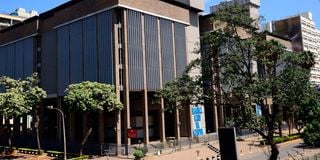Premium
Banks woo rich depositors with 5-year high rates

The Central Bank of Kenya building in Nairobi. Data by the CBK shows that lenders were offering an average 7.7 per cent deposit rate as of May 2023.
Kenyan banks have raised the interest rates paid on fixed deposits to a five-year high to attract new funds from wealthy clients as they seek to stem outflows amid attractive offers from government securities.
Data by the Central Bank of Kenya (CBK) shows that lenders were offering an average 7.7 per cent deposit rate as of May 2023—the highest since June 2018-- amid rising cost of funds for credit.
Sources said some small banks are even offering deposit rates of up to 12 per cent to curb outflows.
The five-year-high deposit rate signals that banks are keen on avoiding being crowded out in the race for cash by the now highly attractive short-term government securities rates.
“Banks are simply luring larger depositors to keep their money with them instead of lending to the State. They are avoiding being crowded out,” said George Bodo, an analyst.
Banks depend on several sources of funds to support their lending business. These include retained profits and borrowed money, including fixed deposits.
High returns on short-term government securities signal a preference for lending to the State rather than the private sector due to the low-risk nature of the investment.
Investors have been increasing their appetite for government papers given the sustained rise in yields on T-bonds and T-bills. For instance, the average interest on the benchmark 91-day Treasury bills during last week’s sale hit 12.11 per cent, the highest since November 2015 when it averaged 12.34 per cent.
The CBK, last Thursday accepted bids worth Sh33.27 billion for 91-day T-bills from investors who demanded interest of 12.11 per cent on average. This was more than eight folds more than what the CBK offered. Investors, however, largely kept away from six- and 12-month government debt facilities whose uptake was a measly 13.47 per cent and 17.74 per cent, respectively, of the Sh10 billion offered for each security.
Traditionally, financial institutions offer better rates for accounts holding larger balances as an incentive to attract high-value clients with considerable assets. The catch here is that with the higher interest rates, the greater the sum that is deposited, the larger the return over time.
Customarily, cash-flush firms and individuals dominate the fixed deposit market where most accounts have millions of shillings locked up for months to one year. Banks don’t pay interest on most savings accounts, with those that do earning substantially lower rates than those on fixed deposit accounts.
Commercial banks have been increasing their loan charges in line with CBK's decision to raise its indicative rate to 10.5 percent which was last seen in July 2016. The Monetary Policy Committee (MPC) of the CBK on June 27 made a surprise raise in the Central Bank Rate(CBR) by one percentage from 9.5 percent, setting the benchmark lending rate at the highest level since July of 2016 or an 82-month high.
The rate of increase was also the highest in nearly eight years since July of 2015 when the CBR rose by 150 basis points.
CBK reports show that liquidity in the money market slightly increased during the week ending July 13, supported by government payments. Commercial banks’ excess reserves stood at Sh 28.3 billion about the 4.25 percent cash reserves requirement.
The average interbank rate was 8.57 percent on July 13 compared to 9.53 percent on July 6. During the week, the average number of interbank deals declined to 25 from 34 in the previous week, while the average value traded declined slightly to Sh 14.3 billion from Sh 14.9 billion in the previous week.





